Six researchers whose work ranges from investigating pre-schoolers urban experiences to how reproduction influences life-history, health and ageing have been honoured with Early Career Researcher Awards.
“What motivates me in my research is finding innovative solutions for real-world problems, to actually make a difference to people's lives. The aspirational goal of my career is to develop new therapeutics that improve cancer patient survival and wellbeing.”
The awards recognise outstanding research achievements by early career staff and the basis for selection is outstanding research achievement, with emphasis being given to achievement during the nominee's appointment at the University of Otago.
The awards went to Dr Meredith Peddie (Human Nutrition), Dr Michael Garratt (Anatomy), Dr Sarah Diermeier (Biochemistry), Dr Charlotte King (Anatomy), Dr Christina Ergler (Geography) and Dr Anna High (Law).
The award consists of a $5000 grant to be used to assist the recipients' research and membership to the O-Zone Group.
O-Zone co-convenor Dr Nic Rawlence says: “The calibre of this year's recipients is truly outstanding and showcases how Otago's early career researchers are leading their respective fields of expertise. It will be exciting to see how their careers progress in the future”
Professor Richard Blaikie, Deputy Vice-Chancellor (Research and Enterprise), who chairs the awards selection panel, says the panel are thrilled to be able to recognise the talent and potential of this group of outstanding early-career researchers.
“The work that they have done already has been recognised through the award of significant research grants or peer recognition from within their disciplines, so it is fitting for the University to recognise their achievements also. We look forward to seeing the important and significant contributions they will make in the years ahead.”
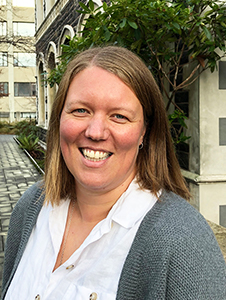
Dr Meredith Peddie
Dr Meredith Peddie (Department of Human Nutrition)
Dr Meredith Peddie is an internationally recognised leader in sedentary behaviour research. Her work has explored a range of topics including introducing physical activity within sedentary occupational environments, and a recent innovative study examining the effects of taking breaks from evening streaming on sleep and glucose metabolism.
She has secured almost half a million dollars in research funding and already been involved in the supervision of 47 postgraduate students. Over the last two years, Dr Peddie has led a large project investigating the nutritional status, motivations and beliefs around diet and physical activity patterns of New Zealand adolescents.
Her work is having both national and international policy implications, including recent expert commentary on the release of the WHO Guidelines on Sedentary Behaviour and Physical Activity. Dr Peddie's work is also informing professional practice policy aimed at improving health and well-being.
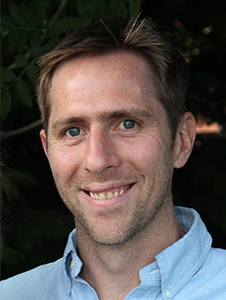
Dr Michael Garratt
Dr Michael Garratt (Department of Anatomy)
Dr Michael (Mike) Garratt is a Senior Lecturer in the Department of Anatomy. His high-quality research and publications intersect reproduction, physiology, behaviour and evolutionary biology.
“I enjoy having the opportunity to choose research questions that I think are interesting, and to creatively design experiments that no one has thought of before.”
His main research interests lie in understanding how reproduction influences life-history, health and ageing. This includes the startling discovery that the act of mating causes major changes to a female animal's life course, increasing body growth and fertility but shortening lifespan.
The collaborative projects he has been instrumental in establishing are generating new ideas and research initiatives in New Zealand and internationally. His record of high-quality publishing places him among the international leaders in his field, with an impressive 39 papers in top-flight journals.
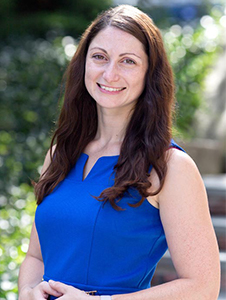
Dr Sarah Diermeier
Dr Sarah Diermeier (Department of Biochemistry)
Soon after her appointment as a lecturer to Otago's Department of Biochemistry in 2018, Dr Sarah Diermeier was awarded a prestigious Rutherford Discovery Fellowship. Since then, she has rapidly developed her research programme on understanding the role of long non-coding RNAs (lncRNAs) in cancer with a focus on targeting them for the development of new therapeutics.
“What motivates me in my research is finding innovative solutions for real-world problems, to actually make a difference to people's lives. The aspirational goal of my career is to develop new therapeutics that improve cancer patient survival and wellbeing.”
She is committed to having her research translated into the clinical and commercial space. Her successes include leading the formation of a new company Amaroq Therapeutics, securing the biggest investment Otago Innovation has ever received ($14m).
Dr Diermeier's success in attracting postgraduate students and obtaining funding has built a vibrant and successful research team, and a research programme with cutting-edge research techniques and capabilities.
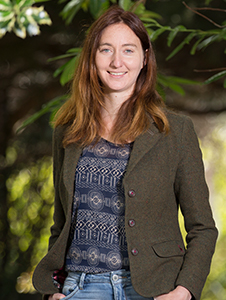
Dr Charlotte King
Dr Charlotte King (Department of Anatomy)
This Otago graduate is a rising star in biological anthropology. After gaining her PhD in 2013 from Durham University (UK), Dr King was awarded a Rutherford Foundation Postdoctoral Fellowship to look at the effects of agriculture and climate change in prehistoric Chile. She continued her work in Chile employed as a Postdoctoral Fellow under a Marsden project.
Her research centred on the agricultural transition in Northern Chile, and the use of incremental isotopic sampling techniques to identify changes to fertility, and subsistence strategy in variable climatic conditions. Here, she used newly developed techniques to look at individual life-histories, and reconstruct events experienced by some of the earliest inhabitants of the driest desert in the world.
“It's amazing to me that our body's tissues contain chemical records of our lives. In my research I get to reveal those stories and help the people of the present connect with the people of the past.”
In 2018, Dr King was awarded a Marsden Fast-Start Grant to research colonial experiences in Aotearoa/New Zealand. Read more in her blog.
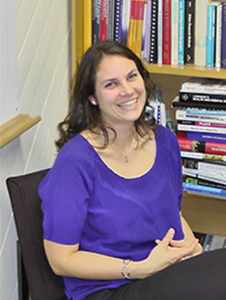
Dr Christina Ergler
Dr Christina Ergler (School of Geography)
Dr Christina Ergler's research lies at the cross-roads of geography, sociology and public health in the minority and majority world, focussing how were we live, play, study and spend our leisure time affects our health and wellbeing, be it through contacts with or exposure to hazards (such as drugs, accidents and waste), access to and utilisation of health care or by feelings of safety and wellbeing in a neighbourhood
“I want my work to contribute to a more just, sustainable and inclusive world by alerting stakeholders and communities to the socio-spatial, structural and experiential dimensions of health and wellbeing. The Geographies of Health and Wellbeing are an important and growing area well linked to many job opportunities and attracts people who are interested in making the world a better place through the work they do.
In addition to teaching from 100 to 400-level, Dr Ergler's current research projects include work on pre-schoolers urban experiences (her recent work, Pre-schoolers as Competent Evaluators of their City, has been widely publicised), Pasifika children's sense of belonging, cultural stigma during COVID19 and how communities support primary birth. She has produced more than 30 first-authored publications and has a funding record of over NZ$1.7million, which includes grants from the Royal Society New Zealand Marsden fund and Health Research Council.
Her innovative contribution to the discipline of Geography has also been recognised with the Emerging Researcher Award from the New Zealand Geographical Society (2016) and being awarded an Honorary Associate Professorship at Nottingham University (UK).
“The award is a wonderful motivation to continue my work on disrupting social, health, and environmental injustices as they relate to people's well-being and well-becoming. I am eager to further privilege the voices of marginalised groups to address the systemic structural inequities and broader social and environmental determinants of health/wellbeing/well-becoming. My work so far would have not be possible without the generosity of participants sharing their stories and I am extremely thankful to each of them and my wonderful mentors, colleagues, friends and family for their support, motivation, encouragement and asking the hard questions over the years.”
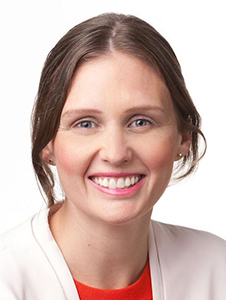
Dr Anna High
Dr Anna High (Faculty of Law)
Dr Anna High is a socio-legal scholar who has adopted a “law in action” approach to three main areas of interest: Chinese law, feminist theory/sexual violence, and evidence law.
She has also published in the area of legal education/pedagogy. Following the completion of her doctorate at the University of Oxford as a Rhodes Scholar (Qld & Magdalen), Anna was Distinguished Scholar-in-Residence and American Council of Learned Societies Postdoctoral Fellow at the Loyola University Chicago School of Law.
Since joining the Faculty of Law in 2017, Anna has completed a monograph on orphan relief in China, which was awarded the 2020 Asian Law and Society Association Distinguished Book Award. She holds current research grants from Marsden and the New Zealand Law Foundation and is co-founder/director of the newly established Otago Centre for Law and Society.
Her most recent work, exploring a theory of “sexual dignity” in feminist legal theory and comparative case law, is forthcoming in the Yale Journal of Law & Feminism.